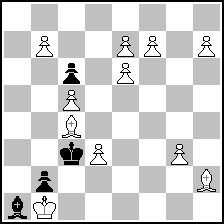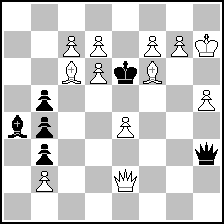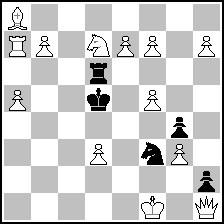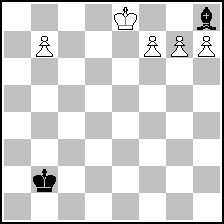
Website founded by
Milan Velimirović
in 2006
23:41 UTC


| |
MatPlus.Net  Forum Forum  General General  Has Köhnlein's 1903 AUW been sucessfully replicated? Has Köhnlein's 1903 AUW been sucessfully replicated? |
| |
|
|
|
|
You can only view this page!
| | | (1) Posted by James Malcom [Saturday, Jul 25, 2020 04:20] | Has Köhnlein's 1903 AUW been sucessfully replicated?
Friedrich Köhnlein's 1903 allumwandlung is one of the most famous and a classic because it fulfilled the 30 year-old Bretano challenge to make a #4 in which four pawns each promote differently don't leave the 8th rank.
Deutsches Wochenschach 1903, #4
 (= 11+4 ) (= 11+4 )
It occured to me that this effect, in the 117 years and counting since Köhnlein composed his gem, that main effect of it has surely been done again in some fashion by another genius.
To my surpise, I only found one such problem in YACPDB and PDB together.
Karl Walter, 5371 Schach 01/1967, Nationales Problemturnier 1966 2. ehrende Erwähnung
#4
P1325120
 (= 12+6 ) (= 12+6 )
Mainline-1. d8=B! Kxd6 2. c8=R! Ke6 3. f8=N+! Kf7 4. g8=Q#
Of course, there are far more lines than in Köhnlein's, but the far different motivation is just as beautiful. The unfortunate side is that both 1. c8=Q and 1. Bd5+ are cooks, but it is somewhat remarkable that there are only two cooks with so much potential firepower just waiting to be born.
Can anyone discover or share other #4 that show this effect, but correctly? Cookd problems are welcome for show though.
| | | (2) Posted by Alain Villeneuve [Saturday, Jul 25, 2020 09:12] |
What about this one ?
 (= 13+5 ) (= 13+5 )
4# (JL Rossetti, 1949).
| | | (3) Posted by Joost de Heer [Saturday, Jul 25, 2020 11:04] |
Lennart Werner, Springaren 1997
#4 Marscirce
 (= 5+2 ) (= 5+2 )
| | | (4) Posted by James Malcom [Saturday, Jul 25, 2020 17:23]; edited by James Malcom [20-07-25] |
Yes, that is precisely what I'm looking for Joost. The 1949 one is very good with the silent bishop promotion key. Fairy conditions make it too easy, IMO. How does Marscirce worK? I am familiar with regular and anti Circe
| | | (5) Posted by Joost de Heer [Saturday, Jul 25, 2020 18:12] |
Mars circe: A piece captures by capturing from its rebirth square. E.g. a white king can only capture on d1, d2, e2, f2 and f1. After the first move (1. f8=Q), the queen guards a1, b1, c1, c2, b3 and a4. The white pawn on b7 guards a3 and b3, so the black king only can go to a2. Since f8 is occupied, the black bishop can't move at all.
| | | (6) Posted by Juraj Lörinc [Saturday, Jul 25, 2020 20:33] |
"Fairy conditions make it too easy, IMO."
IMO, too easy is not the most precise adjective. Finding the right fairy element to express the demanding theme in the extremely economical form is either a result of hard work or luck, in any case not everyone can make it. It is rather a different story in different genre, even if some elements of the story are the same. Romeo and Juliet vs. West Side Story.
| | | (7) Posted by James Malcom [Sunday, Jul 26, 2020 15:52]; edited by James Malcom [20-07-26] |
I agree Juraj-I simply oversimplified fairy chess in one go-my bad.
| |
No more posts |
MatPlus.Net  Forum Forum  General General  Has Köhnlein's 1903 AUW been sucessfully replicated? Has Köhnlein's 1903 AUW been sucessfully replicated? |
|
|
|
 ISC 2024
ISC 2024 Forum
Forum  General
General  Has Köhnlein's 1903 AUW been sucessfully replicated?
Has Köhnlein's 1903 AUW been sucessfully replicated? 


